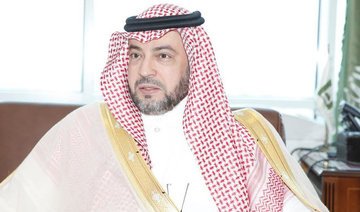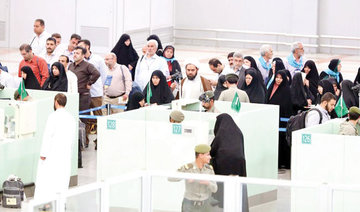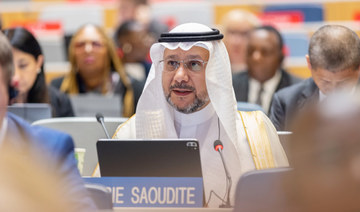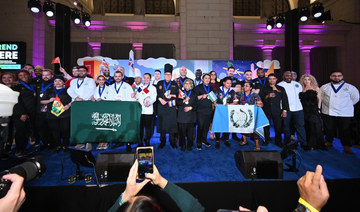AMMAN: For 30 years, Palestinian Muslims who were Israeli citizens were denied one of the five tenets of Islam: The Hajj to Makkah and Madinah. This changed when the Arab League voted in 1977 to make special arrangements to allow Palestinian Muslims who remained in what became Israel after the 1948 war to be able to join Muslims from around the world in the annual pilgrimage.
Jordan was asked to organize their travel by giving them temporary Jordanian passports, since there are no diplomatic relations between Israel and Saudi Arabia. In addition, Jordan’s Ministry of Awqaf and Islamic Affairs arranges all issues relating to the Hajj, including who goes, transport to the holy places in Saudi Arabia and accommodation. This single-source arrangement continues to this day, and some 4,500 pilgrims are granted Saudi visas annually.
Amid the initial excitement of being able to break out of the isolation from the Arab and Islamic worlds, lack of competition has created problems such as higher prices and worsening services. In 2010, the High Follow-Up Committee for Arab Citizens of Israel met and created a fact-finding commission to study the deteriorating situation and make recommendations.
Sheikh Ibrahim Sarsour, a former member of Israel’s Parliament and former head of the Islamic movement in Israel, told Arab News that he was very happy with the commission’s work. “We looked at the problem from all angles, interviewed pilgrims who made the trip, and made substantial recommendations on how these problems need to be addressed,” said Sarsour, who was a leading member of the commission.
For months, it reviewed thousands of complaints about travel problems, exorbitant prices and inferior services. It noted the unprofessionalism of the way the entire Hajj process was handled, and hinted at the possibility of financial and administrative irregularities.
The report was presented at a press conference in Nazareth on Oct. 3, 2011. The commission met with Jordan’s Awqaf minister and handed him a copy of the report, which urged a total change in the way the Hajj process is handled. The recommendations included the need for the resignation of the ad hoc committee that was engaged with the Jordanian authorities, to be replaced by a proper institutional organization with clear governance criteria.
Sarsour said despite the official welcome by the Jordanian Waqf, the report and its findings were never looked into. This prompted him to write to the newly appointed Awqaf Minister Hael Daoud in October 2013 to remind him of the report and ask him to intervene. Again nothing happened.
Nawaf Al-Allam, a businessman from the town of Kufr Manda in Israel and head of the commission, said he is disappointed that the problems persist. “Muslims wishing to fulfil their duty to Hajj want to have a secure, safe and comfortable trip to Makkah and Madinah and back home,” he told Arab News.
The Hajj process for Palestinians in Israel is tainted and commercialized, and the people involved unqualified, he added. “The only way to rectify the situation is to break up the monopoly that has been created, and apply the same process for travel for Hajj and Umrah as there is in Jordan and other countries.”
Jordan should continue to provide passports to Muslim citizens of Israel wishing to travel to Saudi Arabia, but everything else should be left to professional tour companies, Al-Allam said. Travelers should be able to choose the company they want to travel with, and hold it accountable if they are unhappy with the price or service, he added.
The possibility of flying to Makkah rather than traveling by bus has been suggested. But the absence of diplomatic relations means a plane would need to land in Jordan then continue to Saudi Arabia so the latter would not be accused of normalizing relations with Israel. “If the situation isn’t rectified soon, our leadership will have no choice but to call for a boycott of the lucrative Umrah business,” said Sarsour.
Hajj for Israeli Palestinians: The problem of monopoly
Hajj for Israeli Palestinians: The problem of monopoly
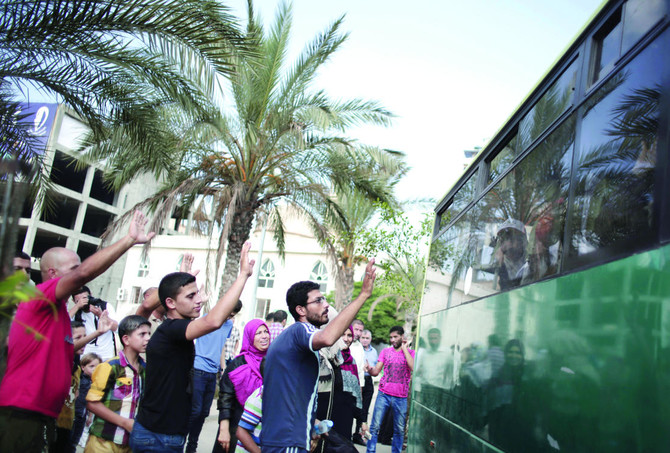
Saudi Ministry of Media, Microsoft Arabia sign memorandum of understanding

- Deal aims to advance media sector in the Kingdom
RIYADH: Saudi Arabia’s Ministry of Media signed a memorandum of understanding with Microsoft Arabia in Riyadh on Tuesday covering several areas of cooperation, the Saudi Press Agency reported.
The signing ceremony was witnessed by the Assistant Minister of Media Abdullah Al-Maghlouth, and Ziad Mansour, Microsoft’s executive vice president of data and artificial intelligence.
Bassem Al-Hazmi, the general manager of digital transformation and information technology and the general manager of cybersecurity, was also present, along with the President of Microsoft Arabia Turki Badhris.
Cooperation will include developing technical aspects in the areas of data analysis, self-learning, AI, security and privacy solutions, and various software and service development solutions.
It will aim to raise the quality of local media content and keep pace with global transformations to serve the future goals of the Ministry of Media.
The memorandum also bids to advance the media sector in the Kingdom, enabling it to contribute to the local economy while benefiting from the developments of AI and its multiple applications in the field of media.
Who’s Who: Mansour Al-Babtain, VP of commercial partnerships and liaison at World Defense Show

Mansour Al-Babtain is the vice president of commercial partnerships and liaison at the World Defense Show.
A former fighter pilot, Al-Babtain has extensive experience working with high-level government figures and private-sector leaders.
He joined the WDS in April 2021. His current role is to oversee the sales, sponsorship and customer experience divisions, in addition to maintaining his liaison responsibilities with Saudi government entities including the General Authority for Military Industries and international delegations.
The department links WDS business owners with the appropriate government entities, ensures the security of the location and people prior to, during and following the show, and manages WDS committees.
From the initial show license to security support, Al-Babtain effectively manages the challenges of ensuring the smooth entry and exit of military supplies, technology, and personnel.
Having graduated from King Faisal Air Academy, he served 12 years in the Royal Saudi Air Force as a fighter pilot, squadron leader and tactical intelligence officer before moving to the Ministry of Defense and later to several government entities.
In addition to his degree in aerial sciences, Al-Babtain holds a master’s degree in strategic studies from Air University in Alabama and a diploma in diplomatic and political relations from the International Arbitration Commission in Cairo.
AI and intellectual property in the spotlight at Arab League meeting

RIYADH: Intellectual property and artificial intelligence will be discussed at a regional meeting of the Arab League’s Intellectual Property and Competitiveness Department on Wednesday.
The virtual gathering, which will be hosted via video link, will include experts from the World Intellectual Property Organization and governmental intellectual property offices from several Arab nations, reported Saudi Press Agency.
Key topics on the agenda are optimizing intellectual property frameworks for AI development, the impact of AI on patenting processes, legislative efforts to address legal challenges, and implications of AI for copyright regulations.
Minister Plenipotentiary Dr. Maha Bakheet, director of legal affairs at the Intellectual Property and Competitiveness Department, said the meeting aimed to safeguard AI models through intellectual property mechanisms and enhance services.
It also hopes to drive service delivery and management progress within regional intellectual property offices.
Saudi recruiters to face heavy fines for visa violations

RIYADH: The General Directorate of Public Security announced that recruiters who postpone reporting the departures of employees as soon as their entry visas expire will be subject to a fine of about SR50,000 ($13,300), imprisonment for up to six months, and deportation of recruitees if they are expatriates.
The directorate called for reporting residency, work and border security regulation violations by dialing the numbers (911) in Makkah, Riyadh and the Eastern Province, and (999) in the rest of the Kingdom.
According to the Saudi Press Agency report, the directorate said that from May 23 until June 21, anyone holding a visit visa of any type is not permitted to enter or remain in Makkah.
A visit visa of any type and name does not entitle its holder to perform the Hajj pilgrimage, added the directorate.
Kawin Incubator Program looks to empower Saudi culinary talents

- Event supports talented chefs, entrepreneurs
RIYADH: The Culinary Arts Authority is hosting the fourth Kawin Incubator Program from June 11 to Aug. 15. The initiative aims to boost culinary skills by supporting talented chefs and entrepreneurs in the food and beverage sector, the Saudi Press Agency reported on Tuesday.
The incubator consists of three main programs. The first is the Kawin Culinary Arts Incubator, featuring six courses. Each course starts with a three-day virtual competition for 80 participants, followed by a two-month, in-person incubation phase for 40 projects, concluding with the graduation of 120 projects.
Participants must be Saudi nationals — aged 18 or above — and passionate about the culinary arts and able to attend the entire program. They must also have an innovative recipe or product.
Kawin, which means create, aims to raise standards in the culinary sector by nurturing startups with innovative concepts, fostering a supportive entrepreneurial environment.
It aims to empower both male and female entrepreneurs in the culinary arts while enhancing the Kingdom’s global reputation in gastronomy.
Those Interested can learn more at https://engage.moc.gov.sa/kawn/.



